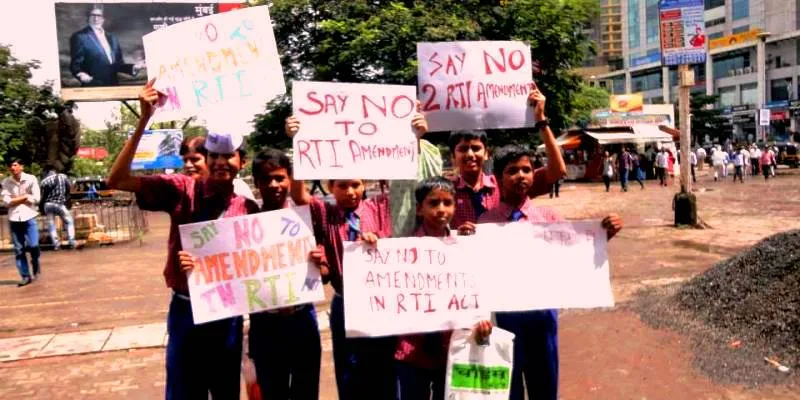Proposed changes to RTI Act invite attacks on activists
The historic Right to Information Act, passed in 2005, struggles to stand its ground today. If the proposed rules are passed by DoPT, the celebrated act might be rendered spineless.

A circular, ‘Framing RTI Rules, 2017 in supersession of RTI Rules, 2012’, was issued by the Department of Personnel and Training (DoPT), the nodal department in charge of implementing the RTI, that seeks to replace the 2012 RTI Rules. A 15-day window, March 30 to April 15, was given to seek public comments on the same.
RTI activists fear that these proposed changes not only shake the foundations on the basis of which the act was formed but also put their lives at high risk.
Aruna Roy, a celebrated activist who championed the RTI Act and a former member of the National Advisory Committee (NAC) under the UPA government, says:
The government has tried to undermine the RTI through a new set of rules. More than 60 information seekers have been killed so far because they have sought information on important, controversial, sensitive issues. And now they are saying that if an information seeker dies, that information will not be released. We are saying that we have been fighting for every single application. No one should think that by killing an individual you will stop that information from coming out.
Incentivising attacks on activists
One of the key contentious changes proposed by the draft rules suggests that the Central Information Commission (CIC) has the power to quash an RTI application in case the seeker dies during the period in between. Draft Rule 12 (2) states, “The proceedings pending before the Commission shall abate on the death of the appellant.”
This provision was present in the earlier 2007 regulations as well.
According to the Commonwealth Human Rights Initiative report, attacks on RTI activists had been on the rise since its implementation. One incident was reported in 2006, seven in 2007, 13 in 2008, 15 in 2009 and more than 47 cases were registered in 2010. In 2011, 83 cases of abuse were reported.
In response to this growing trend of rising attacks on RTI users and activists, the Delhi High Court quashed the rule in 2011. The CIC in September 2011 stated,
If it (CIC) receives a complaint regarding assault or murder of an information seeker, it will examine the pending RTI applications of the victim and order the concerned Department (s) to publish the requested information suo motu on their web site as per the provisions of law.
Post this intervention, following years saw a decrease in these incidents and the reported cases were 36 in 2013, 26 in 2014 and 21 incidents in 2015.
Activists fear that the proposed changes will trigger and incentivise attacks to quash information.
Corruption is a concern
Further draft Rule 12 (1) as proposed by the DoPT, states, “The Commission may in its discretion allow a prayer for withdrawal of an appeal if such a prayer is made by the appellant on an application made in writing duly signed or during hearing. However, no such prayer may be entertained by the Commission after the matter has been finally heard or a decision or order has been pronounced by the Commission.”
Proponents of the RTI suggest that this move questions the entire foundation on which it was conceptualised.
Calling it a “dangerous” move, Aruna believes that withdrawal of application increases the chances of an activist being bribed — monetarily or otherwise.
It means I can be bribed or pressurised to withdraw my application. The whole nature of it (RTI) to fight corruption and arbitrary use of power will go away. It will become a tool of corrupt practices. I think all of us need to fight. Many more provisions and changes are coming in through the rules.
Bucking the legislation
While the proposed changes in the draft rules found mention in the Parliament, the legislation has little power over the execution of the law.
Post the passage of an act by both the houses of the Parliament, it becomes a law. Rules, on the other hand, are guidelines and procedures passed directly, and give power to the authorities.
Section 27 of the RTI Act empowers the central government to implement the law, provide guidelines for seeking and obtaining information through rules.
Venkatesh Nayak, Commonwealth Human Rights Initiative Programme Coordinator, says,
Executive directions issued by the DoPT detailing RTI-related procedures from time to time, strictly speaking, are not ‘law’ because they are never tabled in Parliament. They do not undergo the mandatory exercise of parliamentary scrutiny provided for under Section 29 (1) of the act.
Hence, although parliamentarians can raise concerns about the proposed changes in the draft rules, the house does not have power to vote for or against these clauses.
Enter the SocialStory Photography contest and show us how people are changing the world! Win prize money worth Rs 1 lakh and more. Click here for details!







